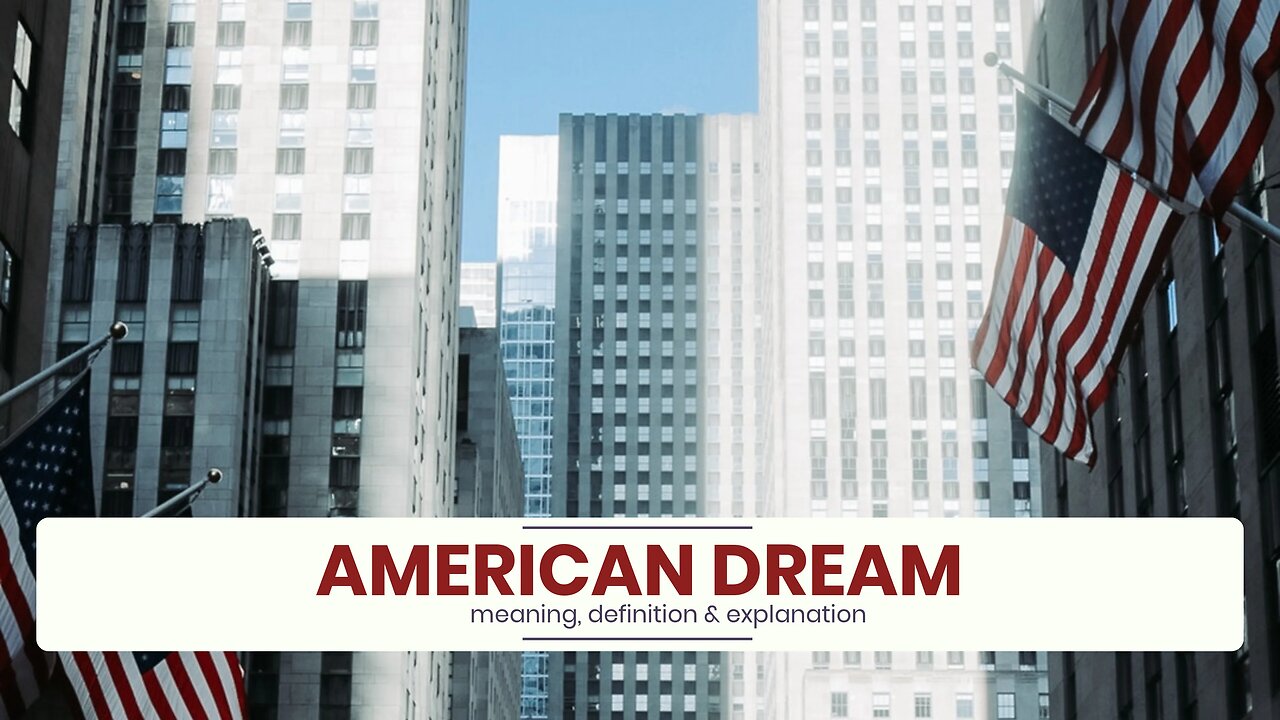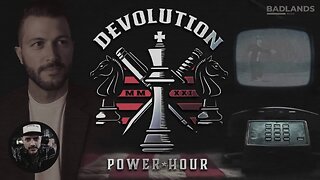Premium Only Content

What is AMERICAN DREAM?
✪✪✪✪✪
http://www.theaudiopedia.com
✪✪✪✪✪
What does AMERICAN DREAM mean? AMERICAN DREAM meaning - AMERICAN DREAM definition - AMERICAN DREAM explanation. What is the meaning of AMERICAN DREAM? What is the definition of AMERICAN DREAM? What does AMERICAN DREAM stand for? What is AMERICAN DREAM meaning? What is AMERICAN DREAM definition?
The American Dream is a national ethos of the United States, the set of ideals (democracy, rights, liberty, opportunity, and equality) in which freedom includes the opportunity for prosperity and success, and an upward social mobility for the family and children, achieved through hard work in a society with few barriers. In the definition of the American Dream by James Truslow Adams in 1931, "life should be better and richer and fuller for everyone, with opportunity for each according to ability or achievement" regardless of social class or circumstances of birth.
The American Dream is rooted in the Declaration of Independence, which proclaims that "all men are created equal" with the right to "life, liberty and the pursuit of happiness."
The meaning of the "American Dream" has changed over the course of history, and includes both personal components (such as home ownership and upward mobility) and a global vision. Historically the Dream originated in the mystique regarding frontier life. As the Royal Governor of Virginia noted in 1774, the Americans "for ever imagine the Lands further off are still better than those upon which they are already settled". He added that, "if they attained Paradise, they would move on if they heard of a better place farther west."
The ethos today implies an opportunity for Americans to achieve prosperity through hard work. According to The Dream, this includes the opportunity for one's children to grow up and receive a good education and career without artificial barriers. It is the opportunity to make individual choices without the prior restrictions that limited people according to their class, caste, religion, race, or ethnicity. Immigrants to the United States sponsored ethnic newspapers in their own language; the editors typically promoted the American Dream. Lawrence Samuel argues:
For many in both the working class and the middle class, upward mobility has served as the heart and soul of the American Dream, the prospect of "betterment" and to "improve one's lot" for oneself and one's children much of what this country is all about. "Work hard, save a little, send the kids to college so they can do better than you did, and retire happily to a warmer climate" has been the script we have all been handed.
The concept is used in popular discourse, and scholars have traced its use in American literature ranging from the Autobiography of Benjamin Franklin, to Mark Twain's The Adventures of Huckleberry Finn (1884), Willa Cather's My Ántonia, F. Scott Fitzgerald's The Great Gatsby (1925), Theodore Dreiser's An American Tragedy (1925) and Toni Morrison's Song of Solomon (1977). Other writers who used the American Dream theme include Hunter S. Thompson, Edward Albee, John Steinbeck, Langston Hughes and Giannina Braschi. The American Dream is also discussed in Arthur Miller's Death of a Salesman; the play's protagonist, Willy, is on a quest for the American Dream.
As Chua (1994) shows, the American Dream is a recurring theme in other literature as well, for example, the fiction of Asian Americans.
Many American authors added American Ideals to their work as a theme or other reoccurring idea, to get their point across. There are many ideals that appear in American Literature such as, but not limited to, all people are equal, The United States of America is the Land of Opportunity, independence is valued, The American Dream is attainable, and everyone can succeed with hard work and determination. John Winthrop also wrote about this term called, American Exceptionalism. This ideology refers to the idea that Americans are the chosen ones, and that they are the light.
A key element of the American Dream is promoting opportunity for one's children, Johnson interviewing parents says, "This was one of the most salient features of the interview data: parents—regardless of background—relied heavily on the American Dream to understand the possibilities for children, especially their own children." Rank et al. argue, "The hopes and optimism that Americans possess pertain not only to their own lives, but to their children's lives as well. A fundamental aspect of the American Dream has always been the expectation that the next generation should do better than the previous generation."
-
 1:26
1:26
The Audiopedia
11 months agoWhat is MOTTO?
48 -
 2:12:29
2:12:29
Badlands Media
16 hours agoDevolution Power Hour Ep. 355: Prom Kings, Puppet Courts, and the Shadow Presidency
149K48 -
 2:05:24
2:05:24
Tundra Tactical
11 hours ago $35.61 earned🛑LIVE NOW!!!! GOP Tanks Guns Rights In Their One Big Beautiful Bill🛑
111K37 -
 19:09
19:09
Forrest Galante
10 hours agoPrivate Tour of Florida's WILDEST Backyard Zoo
47K5 -
 3:18:12
3:18:12
BlackDiamondGunsandGear
1 day ago🔴 Top 5 Guns u NEED to be a "GUN GUY" / with DLD & Fit-N-Fire
61.2K7 -
 3:18:12
3:18:12
DLDAfterDark
10 hours ago $3.75 earnedDLD Live! What Are Your Top 5 Guns??
34.6K3 -
 3:10:03
3:10:03
Mally_Mouse
13 hours agoSpicy Saturday!! - Let's Play: Lockdown Protocol w/Friends!
395K11 -
 LIVE
LIVE
Major League Fishing
3 days agoLIVE! - Bass Pro Tour: Heavy Hitters - Day 1
1,619 watching -
 8:00:02
8:00:02
SpartakusLIVE
13 hours agoWZ Solos || #1 Challenge MASTER brings you Saturday SPARTOONS
66.2K1 -
 9:05:51
9:05:51
Spartan (Pro Halo esports Player)
15 hours agoNo Scrims today so Ranked for a bit then SWTOR
54.6K2